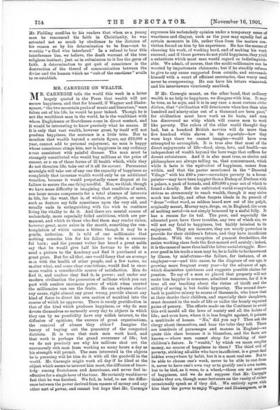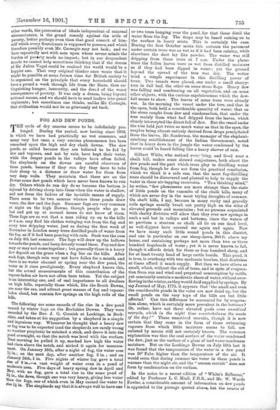MR. CARNEGIE ON WEALTH.
MR. CARNEGIE tells the world this week in a letter largely quoted in the Press that wealth will not secure happiness, and that for himself, if Wagner and Shake- speare, " the two mountain peaks of music and literature," were taken out of his life, he would be poor indeed. Though he is not the wealthiest man in the world, he is the wealthiest with whom Englishmen or Scotchmen come in direct contact, and it would be interesting to know precisely what he means. If it is only that vast wealth, however great, by itself will not produce happiness, the sentence is a little trite. Not to mention that wealth beyond a certain figure, say £10,000 a year, cannot add to personal enjoyment, no man is happy whose conscience stings him, nor is happiness in any ordinary sense consistent with painful disease. The man must be strangely constituted who would buy millions at the price of cancer, or e, en of those forms of ill health' which, while they do not threaten life, take out of it all its savour. Permanent neuralgia will take out of any one the capacity of happiness so completely that immense wealth would only be an additional vexation, because it would perpetually renew disgust at its failure to secure the one thing needful. Nor, we think, though we have some difficulty in imagining that condition of mind, can large means compensate for a total absence of interests in life, for the want, that is, of wishes, or objects, or cares, such as doctors say falls sometimes upon the very old, and usually ends in extinguishing with the wish to continue living the vitality to do it. And there are mental causes of melancholy, more especially foiled ambitions, which are per- manent, and which to those who feel them may render riches, however great, mere ashes in the mouth, something the con- templation of which causes a bitter, though it may be a gentle, irritation. It is told of one millionaire that nothing consoles him for his failure to write a success- ful book; and the present writer has heard a great noble say that he would give half his fortune to be able to send a picture to the Academy and find it purchased at a great price. But for all that, one would fancy that an average man with the health of other people, and a few tastes, no matter what, and some clear convictions, would find in enor- mous wealth a considerable source of satisfaction. Men do find it, and confess they find it, in power; and under our modern civilisation the possession of millions which you can part with confers enormous power of which when exerted the millionaire can see the fruits. He can advance almost any cause, right almost any great wrong, provide almost any kind of force to direct his own section of mankind into the course of which he approves. There is surely gratification in that of the kind which produces happiness, or why do men devote themselves so earnestly every day to objects in which they can by no possibility have any selfish interest, to the diffusion of opinions, the success of great organisations, the removal of abuses they abhor ? Imagine the luxury of buying out the peasantry of the congested districts. It is true that such men work hard, and that work is perhaps the grand sweetener of life; but we do not precisely see why his millions shut put the enormously rich man from working as many hours a day as his strength will permit. The men interested in the objects he is pursuing will let him do it with all the goodwill in the world. Mr. Carnegie might work all day if he liked at the object which seems to interest him most, the diffusion of know- ledg- among Scotchmen and Americans, and never feel in- effective for a single hour of the time. He certainly wouldnever feel that he was finished. We fail, in brief, to see the differ- ence between the power derived from masses of money and any other sort of power, and cannot but hope that Mr. Carnegie
expresses his melancholy opinion under a temporary sense of weariness and disgust, such as the poor may equally feel at certain moments in life, rather than from the mature con- viction forced on him by his experience. He has the means of choosing his work, of working hard, and of making his work succeed ; and if those powers do not yield happiness, they yield a substitute which most men would regard as indistinguish- able. We admit, of course, that the multi-millionaire can be worried by importunate claimants; but if he steadily refuses to give to any cause suggested from outside, and surrounds himself with a court of efficient secretaries, that worry need never be overpowering. He can have his letters winnowed, and his interviewers vicariously snubbed.
If Mr. Carnegie meant, on the other hand, that ordinary wealth is no help to happiness, we disagree with hini. It may be true, as he says, and it is in any case a most curious obiter dictum, that " civilisation will deteriorate when less than nine hundred and ninety-nine out of a thousand are born poor," for civilisation must have work as its basis; and man has discovered no whip which will coerce men to work like poverty. The rulers of the elder world thought they had, but a hundred British navvies will do more than five hundred white slaves in the ergastula—how they were kept there ive cannot imagine—would have even attempted to accomplish. It is true also that most of the direct enjoyments of life—food, sleep, love, and health—are independent of wealth beyond the bare wage that suffices for decent subsistence. And it is also most true, as clerics and philosophers are always tellinc, us, that contentment, which while it lasts is the equivalent of happiness, comes from within, and that the pastor mentioned in the " Deserted Village " with his £40 a year—nowadays poverty to a house-
painter—may I'
have been happier than a Bishop of Durham with a palace, a pack of hounds, and £80,000 a year out of which to found a family. But the cultivated world everywhere, which strives so strenuously to reach wealth, though it may strive much too hardly, and often forgets ideals in its pursuit of " dross "—that word, so seldom heard now out of the pulpit, originally meant, Murray says, dregs, or, in England, the scum of melting metal—is not simply bemused by a sinful folly. It has a reason for its toil. The poor, and especially the educated poor, have three troubles, any two of which are, we will not say fatal to happiness, but highly inimical to its enjoyment. They are insecure, they are nearly powerless to provide for their children's future, and they have insufficient freedom. With the exception of peasant freeholders, the entire working class feels the first-named evil acutely; indeed, it is thecause of more than half the bitter social struggle. How- ever good in his trade a man may be, he is liable to be tlnownout by illness, by misfortune—the failure, for instance, of an employer—or—and this cause, to the disgrace of our age, is growing more frequent every year—by the advance of age, which diminishes quickness and suggests possible claims for pension. To say of a man so placed that property will not make him happier is nonsense, admitted nonsense, for if it is true all our teaching about the virtue of thrift and the utility of saving is but feeble hypocrisy. The second draw- back is positive misery to scores of thousands, who know that at their deaths their children, and especially their daughters, must descend in the scale of life or suffer the hourly repeated pains of penury. The efforts made on the Continent to avoid this evil mould all the laws of society and all the habits of life; and even here, where it is less fought against, it poisons a multitude of homes. " No," did you say ? Then ask the clergy about themselves, and hear the tales they tell. Thee are hundreds of parsonages and manses in England—vie quote this class because it is blameless, and the facts are known where men cannot sleep for thinking of their children's future. Is "wealth," by which we mean surplus money, no source of happiness to them.? The third evil of poverty, striking all alike who have insufficient, is a great deal bidden everywhere by habit, but it is a most real one. Not to be able to choose one's work, never to be able to rest from it, never to have one's own way onto gratify one's own tastes, but to be tied, as it were, to a wheel,—these are not sources of happiness, and we do not suppose that Mr. Carnegie thinks they are, though some lecturers on the vanity of riches occasionally speak as if they did. We entirely agree with him that the power to enjoy Wagner and Shakespeare, or in other words, the possession of ideals independent of external circumstances, is the grand remedy against the evils of poverty, better perhaps even than that good conceit of him- self which every Scotelunan is supposed to possess, and which therefore possibly even Mr. Carnegie may not lack; and we have repeatedly met with men upon whose serene minds the burden of poverty made no impact; but in our despondent moods we cannot help sometimes thinking that if the dream of Sir Julius Vogel could be realised the world would be a happier one. That, very original thinker once wrote that it might be possible at some future time for British society to be organised on the principle that every household should have a pound a week through life from the State, thus ex- tinguishing hunger, insecurity, and the dread of the worst consequences of poverty. It was only a dream, being beyond national means, and we should have .to send loafers into penal regiments; but sometimes one thinks, unlike Mr. carnegie, that civilisation would not be so grievously set back.



























































 Previous page
Previous page